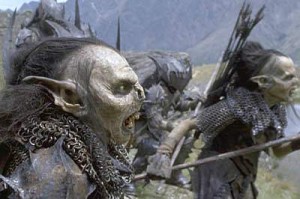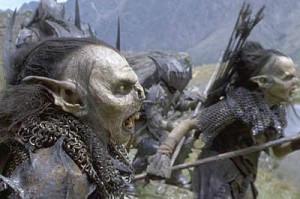In my last post I looked at the biblical foundation for how we should see ourselves and others – that we are made in the image of God. But the Bible develops further on this foundation. The Psalms are a collection of sacred songs and poems used by the Old Testament Hebrews in their worship. Psalm 14 was written by King David ca 1000 B.C. and records the state-of-affairs from God’s point of view.
The LORD looks down from heaven on the sons of men to see if there are any who understand, any who seek God. All have turned aside, they have together become corrupt; there is no one who does good, not even one. (Psalm 14:2-3)
The phrase ‘become corrupt’ is used to describe the entire human race. Since it is something we have ‘become’ the corruption is in reference to that initial state of being in the ‘image of God’. This passage says that the corruption demonstrates itself in a determined independence from God (‘all’ have ‘turned aside’ from ‘seeking God’) and also in not doing ‘good’.
Corrupted – Thinking Elves and Orcs
To better understand this think of the orcs of Middle Earth in the Lord of the Rings as an illustration. Orcs are hideous creatures in appearance, conduct, and in their treatment of the earth. Yet orcs are descended from elves that had become corrupted by Sauron. When you see the stately majesty, harmony and relationship with nature that elves had (think of Legolas and the elves of Lothlorien) and realize that the depraved orcs were once elves who have ‘become corrupt’ you will
get a sense of what is said here about people. God intended elves but what he found was orcs.
This fits exactly with what we noted as a universal tendency among all people in Session Two – that no one lives according to their moral grammar of right and wrong. So here we arrive at a perspective that is very instructive: The biblical starting point of people as sentient, personal, and moral, but then also corrupt, fits with what we observe about ourselves. It is shrewdly spot-on in its assessment of people, recognizing an intrinsic moral nature within us that can easily be overlooked since our actions never actually match what this nature demands of us – because of this corruption. The biblical shoe fits the human foot. However, it raises an obvious question: why did God make us this way – with a moral grammar and yet corrupted from it? As Christopher Hitchens complains:
“… If god really wanted people to be free of such thoughts [i.e., corrupt ones], he should have taken more care to invent a different species.” Christopher Hitchens. 2007. God is not great: How religion spoils everything. p. 100
But this is where in his haste to vent on the Bible that he misses something very important. The Bible does not say that God made us this way, but that something terrible has happened since the initial creation to bring about this difficult state-of-affairs. An important event happened in human history subsequent to our creation. The first humans defied God, as recorded in Genesis, and in their defiance they changed and were corrupted.
The Fall of Mankind
This landmark event in human history is often called The Fall. And we can perhaps understand it better if we think through what Adam faced in his relationship with God when he was created. To give us some further insight we turn to a mid-8th century BC, Old Testament prophet Hosea. As he recounts in his book, his wife had repeatedly cheated on him and run off in a string of affairs. In the midst of his pain and betrayal God commanded him to go and find his wife, reconcile with her, and win her back. Then this episode is used as a picture to show how, in God’s eyes, the Israelites at that time were like the cheating spouse, but God, like Hosea, was willing to reconcile if they would only come clean and come back to Him. In that plea comes a comparison to Adam:
“O Israel and Judah, what should I do with you?” asks the LORD. “For your love vanishes like the morning mist and disappears like dew in the sunlight. … I want you to show love, not offer sacrifices. I want you to know me more than I want burnt offerings. But like Adam, you broke my covenant and betrayed my trust. (Hosea 6:4-7)
In other words, what the Israelites of Hosea’s day were doing was continuing what Adam, the first man, had started. There had been an agreement between God and Adam, similar to a marital contract of faithfulness, and Adam violated it. The book of Genesis records that Adam ate from the Tree of the Knowledge of Good and Evil. There had been a covenant or agreement between God and Adam that he would not eat from that tree – all others were available for him. It was not that there was anything special in the tree itself, but its presence gave Adam a free choice as to whether to remain faithful to God or not. Adam had been created as a sentient person, who was both made and placed into friendship with God at the same moment. Adam had no choice regarding his creation, but God gave him the opportunity to choose concerning his friendship with God, and this choice was centered on the command not to eat from that one tree. Just like the choice to stand is not real if sitting is impossible, the friendship and trust of Adam to God had to be given in the context of a viable alternative, and thus Adam was given a choice as to whether he would remain faithful in his agreement to God or not. We look more closely at this account – and how & in what way we ‘miss the mark’ in the next post.



I think the issues addressed in this post, and probably the next post, are very key parts of this whole discussion. After all, what atheist does not point to the idiocy of humanity when defending his faith?
An important question that each of us must ask ourselves is whether the concept of the Fall is satisfactorily intelligible. For a Christian, the answer is yes, because of the reasons you so nicely illustrated with your “Elves-to-Orcs” analogy: humans were created perfect, but with free will, which led to their choosing evil and corrupting themselves. However, most non-believers, including me, remain unconvinced because they think this progression is inconsistent with the qualities of God.
The way I see it, humans could not have been “perfect” in the beginning if they were created with a descent into evil written into their future. So, obviously, another important issue to discuss is how to reconcile God’s omniscience, and therefore human destiny, with the concept of human free will; but let’s try to assume that God is both omniscient and able to confer free will on His creation.
So immediately before the events of Genesis 1:1, God had a choice to make: to create, or not to create. Being omniscient, He knew that if He chose to create, His creation would become corrupt. Evidently, He decided to create anyway. His knowledge being absolute, He is never wrong; so His creation was on the road to evil from the get-go. How, then, were humans ever “perfect”?
Here’s another way to look at it that just occurred to me. What comes to mind when we think of a morally perfect person? Is it not someone who always chooses to do the right thing? I don’t think there is always one right thing to do, and that therefore a morally perfect person cannot exist…but even if a morally perfect person were possible, the fact that Adam and Eve chose wrongly shows that they were not morally perfect.
If Adam and Eve were not morally perfect, they had moral imperfections. Where did these come from, if not their Creator? Proximally, these imperfections came from themselves, but they in turn came from God, so ultimately, the imperfections came from God. So “evil,” if it exists in the way the Bible describes, came from God.
The fact of the matter is, the “Elves-to-Orcs” model only works if God is a) malicious, as was the Elves’ corruptor Sauron; and/or b) not omniscient, in that He didn’t know His creation would go bad; and/or c) not omnipotent, in that He was not able to create creatures with both moral perfection and free will. In the case of a), God is not worthy of worship. Many people would say that God is not worthy of worship in the cases of b) and c) as well, since they would mean that all our faults and failings are the result of God’s mistake.
I’m glad you brought this up because this is the very core of the conflict between our two philosophies. Understanding the Fall the way you do will probably be my first step back towards the faith, if it is meant to be.
Hi Justin
Great thoughts. I totally agree that depending on how you think about the beginnings, which fork in the road you take here, it will lead you down very different paths. This is why, I think, even though we have the same data to work with, skeptics like Dawkins and Hitchens come to vastly different conclusions than I do – though I see what they see. And we do bump up here with the interplay of human free will and God’s omniscience – which is difficult from our human perspective to understand. But in my thinking on this I would not put the emphasis on Adam being ‘perfect’ like you do. I think more in terms of ‘innocent’. To me this captures the idea that he is not (yet) corrupted, but he is also not (yet) tested (before the temptation). I combine perfection with testing because that is biblical. IT says of Jesus that “In bringing many sons and daughters to glory, it was fitting that God, for whom and through whom everything exists, should make the pioneer of their salvation (ie Jesus) perfect through what he suffered.” Hebrews 2:10. Adam was not ‘perfect’ in this way – though he was innocent.
But I agree that from a Biblical perspective God, knowing that a fall would take place and that his creation would become corrupt, still thought it was worth it and went ahead with it anyways. That begs the questions ‘why’, but that is so difficult to answer from our limited perspective. I do think the Biblical narrative does explain it and I do plan to get into that at some point, but it is too long to think through on a comment here. Coming soon though!
thanks
I had a great time reading the post and the comments. I must say, very polite and respectful. It doesn’t happen often when people of opposite sides discuss sensitive topics like this. I feel there is one element that is missing from the picture … the serpent. Even an ‘innocent’ and ‘perfect’ creature can make wrong decisions. We believe Jesus was perfect and innocent in the same time and satan tried to make Him sin as well but without success. Being perfect it doesn’t mean that you can’t fall. I would draw the attention to the serpent and the methods that the serpent used … deceit, cunning and subtle. Not even the innocent and perfect is spared from temptation and fall. That doesn’t prove that there was something wrong with him. Jesus was morally perfect, but biologically He was not perfect … He was conceived from the Holy Spirit. What that means is that half of his genome came from God and the other half from the fallen and feeble human genome that was deteriorated badly over the thousands of years of sin and abuse. And Jesus didn’t fall. While Adam that was perfect in his constitution had no excuse for his fall. He could not blame God for that. The first thing that he did was to blame his wife that gave him to eat and Eve blamed God that created the serpent. The serpent … who was behind the serpent? Aha … that is a treat punch of the story … that has to be connected with Revelation 12 … the whole mystery is unveiled there. The rebellion against God’s governance started long before Adam and Eve. The drama on earth was just the fall out of the battle from heaven. Who was satan, the old serpent? What was he doing there at God’s throne in heaven? How was he thrown down? Who as his supporters? How did everything start? There has to be more to the story …
Those are very sensible question about Satan’s betrayal of God. I simply think that all that is happening is like a big novel with tons of subplots (which is the specific lives of every person). I think that He made everything for his entertainment for simply he was alone and wanted something fun to do. I also think that being omniscient, Satan betraying God and the fall of mankind was a plotline God planned personally. Being omnipotent, it’s could be very possible that he can simply wipe satan and the demons and all evil away relatively easily. If He is all-powerful, why didn’t he get rid of the demons to make things easier? He needs them to keep the story going. without the bad guys, the story could get boring.
The fall of man shows that God created man with free will. Had there been no free will of man, Adam and Eve could not acted otherwise. They could have done as they were commanded. It could be that Moral emanates from free will which is the result of the workings of the mind of what it is willed. However, desire is one that affects free will. The free will of Eve and Adam was affected by their desire to be like God that is why they succumbed to the serpent’s deception. The fall of mind, I think is more, a product of desire than free will alone.